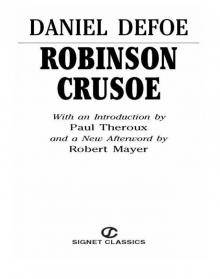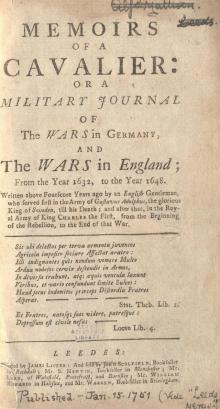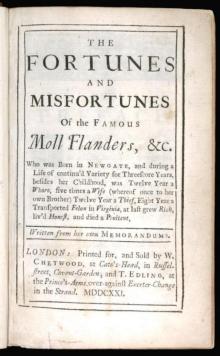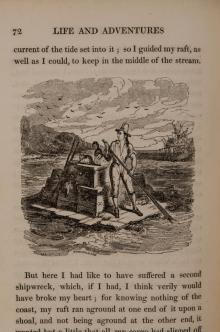- Home
- Daniel Defoe
The Fortunes and Misfortunes of the Famous Moll Flanders Page 2
The Fortunes and Misfortunes of the Famous Moll Flanders Read online
Page 2
the endof the life of this famous Moll Flanders, as she calls herself, fornobody can write their own life to the full end of it, unless they canwrite it after they are dead. But her husband's life, being written bya third hand, gives a full account of them both, how long they livedtogether in that country, and how they both came to England again,after about eight years, in which time they were grown very rich, andwhere she lived, it seems, to be very old, but was not so extraordinarya penitent as she was at first; it seems only that indeed she alwaysspoke with abhorrence of her former life, and of every part of it.
In her last scene, at Maryland and Virginia, many pleasant thingshappened, which makes that part of her life very agreeable, but theyare not told with the same elegancy as those accounted for by herself;so it is still to the more advantage that we break off here.
MOLL FLANDERS
My true name is so well known in the records or registers at Newgate,and in the Old Bailey, and there are some things of such consequencestill depending there, relating to my particular conduct, that it isnot be expected I should set my name or the account of my family tothis work; perhaps, after my death, it may be better known; at presentit would not be proper, nor not though a general pardon should beissued, even without exceptions and reserve of persons or crimes.
It is enough to tell you, that as some of my worst comrades, who areout of the way of doing me harm (having gone out of the world by thesteps and the string, as I often expected to go), knew me by the nameof Moll Flanders, so you may give me leave to speak of myself underthat name till I dare own who I have been, as well as who I am.
I have been told that in one of neighbour nations, whether it be inFrance or where else I know not, they have an order from the king, thatwhen any criminal is condemned, either to die, or to the galleys, or tobe transported, if they leave any children, as such are generallyunprovided for, by the poverty or forfeiture of their parents, so theyare immediately taken into the care of the Government, and put into ahospital called the House of Orphans, where they are bred up, clothed,fed, taught, and when fit to go out, are placed out to trades or toservices, so as to be well able to provide for themselves by an honest,industrious behaviour.
Had this been the custom in our country, I had not been left a poordesolate girl without friends, without clothes, without help or helperin the world, as was my fate; and by which I was not only exposed tovery great distresses, even before I was capable either ofunderstanding my case or how to amend it, but brought into a course oflife which was not only scandalous in itself, but which in its ordinarycourse tended to the swift destruction both of soul and body.
But the case was otherwise here. My mother was convicted of felony fora certain petty theft scarce worth naming, viz. having an opportunityof borrowing three pieces of fine holland of a certain draper inCheapside. The circumstances are too long to repeat, and I have heardthem related so many ways, that I can scarce be certain which is theright account.
However it was, this they all agree in, that my mother pleaded herbelly, and being found quick with child, she was respited for aboutseven months; in which time having brought me into the world, and beingabout again, she was called down, as they term it, to her formerjudgment, but obtained the favour of being transported to theplantations, and left me about half a year old; and in bad hands, youmay be sure.
This is too near the first hours of my life for me to relate anythingof myself but by hearsay; it is enough to mention, that as I was bornin such an unhappy place, I had no parish to have recourse to for mynourishment in my infancy; nor can I give the least account how I waskept alive, other than that, as I have been told, some relation of mymother's took me away for a while as a nurse, but at whose expense, orby whose direction, I know nothing at all of it.
The first account that I can recollect, or could ever learn of myself,was that I had wandered among a crew of those people they call gypsies,or Egyptians; but I believe it was but a very little while that I hadbeen among them, for I had not had my skin discoloured or blackened, asthey do very young to all the children they carry about with them; norcan I tell how I came among them, or how I got from them.
It was at Colchester, in Essex, that those people left me; and I have anotion in my head that I left them there (that is, that I hid myselfand would not go any farther with them), but I am not able to beparticular in that account; only this I remember, that being taken upby some of the parish officers of Colchester, I gave an account that Icame into the town with the gypsies, but that I would not go anyfarther with them, and that so they had left me, but whither they weregone that I knew not, nor could they expect it of me; for though theysend round the country to inquire after them, it seems they could notbe found.
I was now in a way to be provided for; for though I was not a parishcharge upon this or that part of the town by law, yet as my case cameto be known, and that I was too young to do any work, being not abovethree years old, compassion moved the magistrates of the town to ordersome care to be taken of me, and I became one of their own as much asif I had been born in the place.
In the provision they made for me, it was my good hap to be put tonurse, as they call it, to a woman who was indeed poor but had been inbetter circumstances, and who got a little livelihood by taking such asI was supposed to be, and keeping them with all necessaries, till theywere at a certain age, in which it might be supposed they might go toservice or get their own bread.
This woman had also had a little school, which she kept to teachchildren to read and to work; and having, as I have said, lived beforethat in good fashion, she bred up the children she took with a greatdeal of art, as well as with a great deal of care.
But that which was worth all the rest, she bred them up veryreligiously, being herself a very sober, pious woman, very house-wifelyand clean, and very mannerly, and with good behaviour. So that in aword, expecting a plain diet, coarse lodging, and mean clothes, we werebrought up as mannerly and as genteelly as if we had been at thedancing-school.
I was continued here till I was eight years old, when I was terrifiedwith news that the magistrates (as I think they called them) hadordered that I should go to service. I was able to do but very littleservice wherever I was to go, except it was to run of errands and be adrudge to some cookmaid, and this they told me of often, which put meinto a great fright; for I had a thorough aversion to going to service,as they called it (that is, to be a servant), though I was so young;and I told my nurse, as we called her, that I believed I could get myliving without going to service, if she pleased to let me; for she hadtaught me to work with my needle, and spin worsted, which is the chieftrade of that city, and I told her that if she would keep me, I wouldwork for her, and I would work very hard.
I talked to her almost every day of working hard; and, in short, I didnothing but work and cry all day, which grieved the good, kind woman somuch, that at last she began to be concerned for me, for she loved mevery well.
One day after this, as she came into the room where all we poorchildren were at work, she sat down just over against me, not in herusual place as mistress, but as if she set herself on purpose toobserve me and see me work. I was doing something she had set me to;as I remember, it was marking some shirts which she had taken to make,and after a while she began to talk to me. 'Thou foolish child,' saysshe, 'thou art always crying (for I was crying then); 'prithee, whatdost cry for?' 'Because they will take me away,' says I, 'and put me toservice, and I can't work housework.' 'Well, child,' says she, 'butthough you can't work housework, as you call it, you will learn it intime, and they won't put you to hard things at first.' 'Yes, theywill,' says I, 'and if I can't do it they will beat me, and the maidswill beat me to make me do great work, and I am but a little girl and Ican't do it'; and then I cried again, till I could not speak any moreto her.
This moved my good motherly nurse, so that she from that time resolvedI should not go to service yet; so she bid me not cry, and she wouldspeak to Mr. Mayor, and I should not go to service till I was bigger.
Well, this did not satisfy me, for to think of going to service wassuch a frightful thing to me, that if she had assured me I should nothave gone till I was twenty years old, it would have been the same tome; I should have cried, I believe, all the time, with the veryapprehension of its being to be so at last.
When she saw that I was not pacified yet, she began to be angry withme. 'And what would you have?' says she; 'don't I tell you that youshall not go to service till your are bigger?' 'Ay,' said I, 'but thenI must go at last.' 'Why, what?' said she; 'is the girl mad? Whatwould you be--a gentlewoman?' 'Yes,' says I, and cried heartily till Iroared out again.
This set the old gentlewoman a-laughing at me, as you may be sure itwould. 'Well, madam, forsooth,' says she, gibing at me, 'you would bea gentlewoman; and pray how will you come

 Captain Singleton
Captain Singleton An Essay Upon Projects
An Essay Upon Projects Moll Flanders Moll Flanders Moll Flanders
Moll Flanders Moll Flanders Moll Flanders The Further Adventures of Robinson Crusoe
The Further Adventures of Robinson Crusoe Everybody's Business Is Nobody's Business
Everybody's Business Is Nobody's Business Robinson Crusoe
Robinson Crusoe The Storm
The Storm The King of Pirates
The King of Pirates History of the Plague in London
History of the Plague in London Memoirs of a Cavalier
Memoirs of a Cavalier_preview.jpg) The Life and Most Surprising Adventures of Robinson Crusoe, of York, Mariner (1801)
The Life and Most Surprising Adventures of Robinson Crusoe, of York, Mariner (1801) A Journal of the Plague Year
A Journal of the Plague Year_preview.jpg) The Life and Adventures of Robinson Crusoe (1808)
The Life and Adventures of Robinson Crusoe (1808) A General History of the Pyrates: / from their first rise and settlement in the island of Providence, to the present time
A General History of the Pyrates: / from their first rise and settlement in the island of Providence, to the present time The Fortunes and Misfortunes of the Famous Moll Flanders
The Fortunes and Misfortunes of the Famous Moll Flanders_preview.jpg) The Fortunate Mistress (Parts 1 and 2)
The Fortunate Mistress (Parts 1 and 2) Robinson Crusoe — in Words of One Syllable
Robinson Crusoe — in Words of One Syllable From London to Land's End
From London to Land's End A New Voyage Round the World by a Course Never Sailed Before
A New Voyage Round the World by a Course Never Sailed Before Roxana
Roxana The Life and Adventures of Robinson Crusoe of York, Mariner, Volume 1
The Life and Adventures of Robinson Crusoe of York, Mariner, Volume 1_preview.jpg) Memoirs of Major Alexander Ramkins (1718)
Memoirs of Major Alexander Ramkins (1718) Dickory Cronke
Dickory Cronke Robinson Crusoe (Penguin ed.)
Robinson Crusoe (Penguin ed.) Moll Flanders
Moll Flanders The Further Adventures of Robinson Crusoe rc-2
The Further Adventures of Robinson Crusoe rc-2